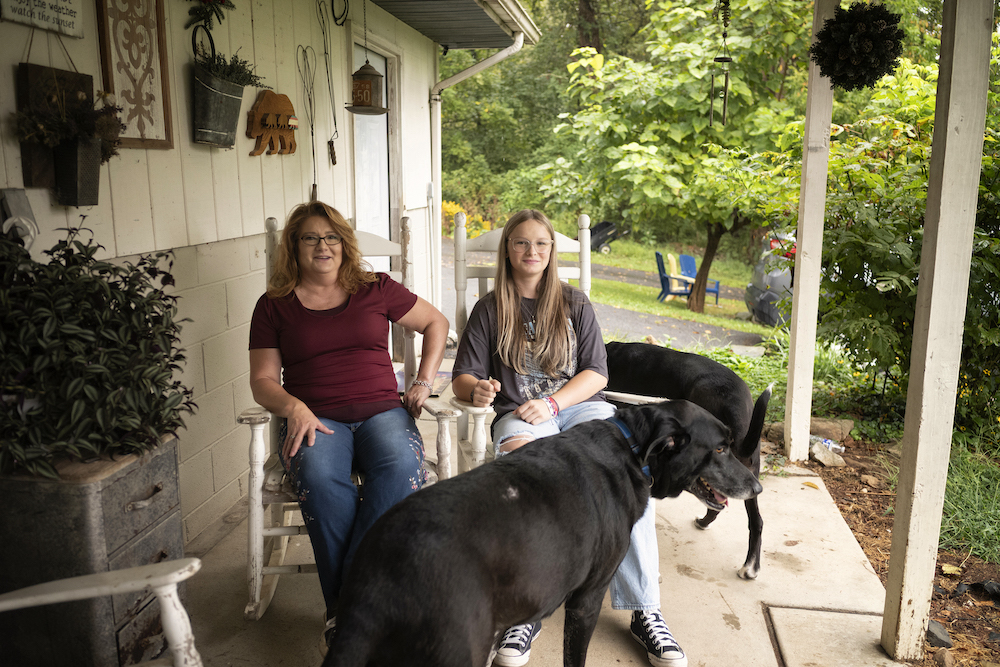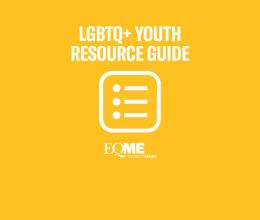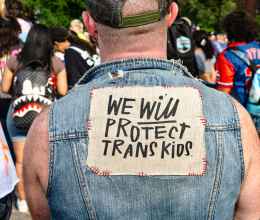Over the last five years, politicians across the country have targeted transgender people and our families. They’ve banned our health care, censored our speech, and made schools less safe for transgender students. One of the most consistent focus areas for many of these politicians has been the rights of transgender student athletes, specifically the right of transgender girls, to play with other girls. While the overall number of transgender athletes is extremely small–most states have fewer than a handful of transgender students playing sports among 10s of thousands of student athletes– politicians have introduced hundreds of bills over the last few years targeting their ability to play.
Now, the Supreme Court will hear our challenge against a state law that categorically bans transgender students from girl’s teams. Politicians hope to use the case to legitimize a broad range of discrimination against transgender people (and all LGBTQ people), excluding us not just from sports teams but from civil rights protections and pushing us further out of public life altogether.
Before the Court: BPJ v. West Virginia
Becky Pepper-Jackson of West Virginia is just like any other 15-year-old.She loves spending time with her friends, playing with her brothers, and is active in her school’s band and track & field team, throwing discus and shotput. But under a ban passed by the West Virginia state legislature, Pepper-Jackson would be prohibited from playing on the girls’ team. “She likes to do the best in everything, be it algebra or running or shot put or discus,” her mother told NBC News. “She tries to excel in everything that she does, just like any other kid.”
While Pepper-Jackson is the only openly transgender athlete in the state of West Virginia, she has become the focus of relentless attacks by politicians in the state, including the state’s governor. With the help of Lambda Legal and Cooley LLP, the ACLU and the ACLU of West Virginia filed a lawsuit on behalf of Pepper-Jackson and her mother challenging the ban on the grounds it violates her rights under Title IX – the federal law prohibiting sex discrimination in public schools – and the Equal Protection Clause of the 14th Amendment.
How Many Transgender Athletes Are There?
There is no comprehensive count of transgender student athletes in K-12, collegiate, or professional sports in the United States, but what we do know is that they represent a tiny fraction of athletes overall. The president of the NCAA even recently told Congress, “less than 10” (and not all of them transgender women) of the more than 500,000 college athletes in the country are openly transgender.
Nonetheless, they have become the focus of a relentless media campaign designed to make their participation seem like a threat to girls who are not transgender. The goal of this campaign is not only dividing us against one another, it’s to secure a sweeping legal precedent that endangers transgender people (and other people, including gay, lesbian and bisexual people, and all women) across our lives, not just in sports.
What’s at Stake at The Supreme Court
The court is likely to rule on whether the state bans targeting transgender students violate either Title IX or the Equal Protection Clause. What we don’t know–and won’t know until that ruling is handed down–is whether that ruling will be narrowly tailored to the context of athletics or implicate a broad range of rights for transgender people.

Credit: Scout Tufankjian
Many of the political attacks on transgender people have focused on areas of the law where we already experience discrimination–access to public bathrooms or the sex designation that goes on documents like driver’s licenses and passports, for example. Depending on the precise language of the court’s ruling, it could likewise implicate our fight for equality in those contexts and potentially many more, like our access to health care and our safety while incarcerated.
This is why, even though the number of transgender students in athletics is small, their right to play has become a central focus of politicians who want to push transgender people out of public life altogether. Their hope is that a Supreme Court ruling against the rights of girls like Pepper-Jackson will allow them to discriminate against transgender people in many more contexts and, eventually, deny us our freedom to be ourselves entirely.
“Fairness” in Sex-Based Competition
First, it’s important to recognize that a girl like Pepper-Jackson is not trying to “cheat” her way into women’s sports or take away opportunities from other girls. Who she is on the playing field is who is with her friends, her family, and in her community, and transgender youth and their families want the same thing for their future that we all do–safe schools, strong communities, and equal opportunities to succeed.
Second, transgender girls are not “biological males” as many politicians accuse them of being. In fact, the states in both these cases have tried to exclude any scientific evidence about the impacts of gender-affirming medical care that girls like Pepper-Jackson relies on because, ultimately, they do not care about things like hormone levels or muscle mass; they want to exploit concern for women athletes and widely-held assumptions about sex and gender to define transgender people’s identities and rights for us while falsely claiming the “science” is on their side.
Lastly, as any competitive athlete can tell you, all athletes carry advantages and disadvantages depending on the sport, their background, their experience, their genetics, and their physical ability. Excluding transgender girls on the basis of advantages they may or may not have, while ignoring the wide varieties of body types and physical ability among all women, is both discriminatory to transgender girls and relies on very old stereotypes of women as inherently petite and weak (something that anyone who watches women’s sports can tell you is very far from the truth).
Protecting Women’s Sports by Fighting Real Inequities
Bans such as West Virginia’s are opposed by Billie Jean King, Megan Rapinoe, Sue Bird, Brianna Turner, Dawn Staley, the Women’s Sports Foundation, the National Women’s Basketball Players Association, and many more allies to girls like Pepper-Jackson. In contrast, the bans are being defended by the same conservative activists that overturned Roe v. Wade and oppose marriage equality for same-sex couples–not because they care about women’s sports but because transgender people’s very existence violates their own ideology.
Athletics is a critical part of the lives of millions of youth in the United States. It helps them learn teamwork and dedication while helping them become an active and thriving member of their broader community. This is especially true for kids who are isolated, bullied, and ostracized by their peers–playing sports is often a way for adolescents to overcome the sense they’re just too “different” from others to make friends and succeed.
But more than fifty years after Title IX, women athletes continue to face real and widespread barriers–from racial disparities in athletic opportunities to unequal pay for professionals and harassment and abuse–but the participation of transgender girls like Pepper-Jacksons simply is not one of them. We can win the future all women and girls deserve by playing on the same team for fairness, safety, and equal opportunities and rejecting efforts by politicians to divide us.










